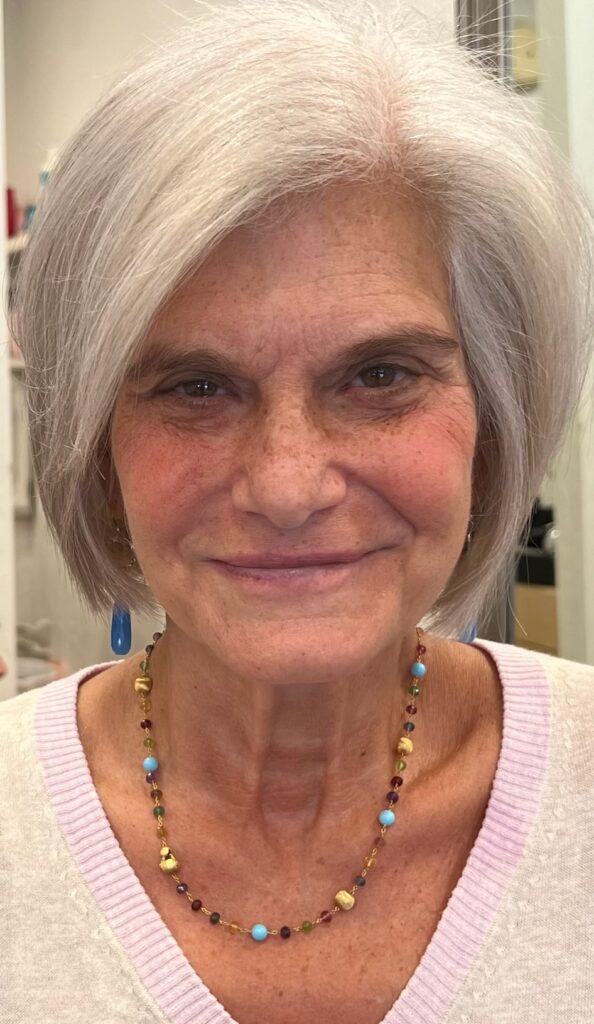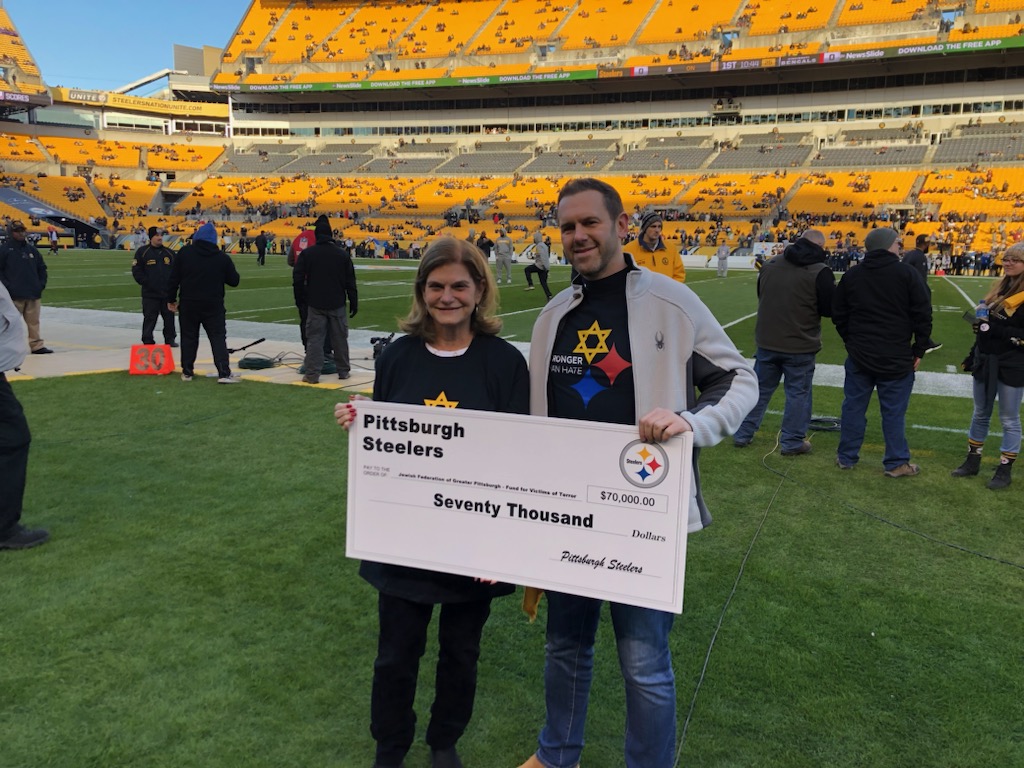For Meryl Kirshner Ainsman, Oct. 27, 2018, began with the sound of sirens cutting through the air and frantic knocks on her front door.
Ainsman was in her kitchen preparing breakfast with her grandson.
“All of a sudden, there were police cars zooming past my house,” she remembered. “The first one wasn’t a big deal then, all of a sudden, there were more and more and more and more and more. I turned to my husband, who was with me in the kitchen, and said, ‘There’s something very serious going on.’”
Ainsman, a lifelong Pittsburgher and then-board chair of the Jewish Federation of Greater Pittsburgh, told her husband, David, that she suspected that whatever was happening probably involved someone they knew.

At that moment, “there was a loud banging at the door, like a knock, but it wasn’t just a knock. It was a banging,” she said.
At the door was a young man in a kippah, whom Ainsman did not know. He was “beside himself and out of breath,” she said.
The man asked if he could use the Ainsmans’ phone.
“‘I need to call my wife. There’s been a shooting at the Tree of Life,’” she recalled him saying. “That’s how I found out.”
The man was shomer Shabbat — meaning he strictly observed the Sabbath — and didn’t have his phone but was on his way to meet his wife at Congregation Beth Shalom. When he passed the Tree of Life building, he told Ainsman, a police officer looked at him and said, “Run as far as you can. Get out of here.”
“He ended up at my door,” Ainsman said, “which was just bizarre.”
Ainsman called federation President and CEO Jeff Finkelstein, who had just returned from a trip to Israel the night before. She also made sure that the federation’s then-Director of Community Security Brad Orsini also knew what was happening.
Ainsman’s house was soon filled with family and friends. One of her sons-in-law had a police scanner and was monitoring the incident, the television news was on, and, while attempting to make sense of what had happened, the adults were trying to keep Ainsman’s grandchildren from knowing what was going on down the road from their house.
When her phone started ringing, the first calls were from Israel. Journalists there began reporting on the shooting immediately. Aisnman’s friends from across the Jewish state also began contacting her.
Her instinct was to head to the Tree of Life building.
“That’s really what I felt like I needed to do,” she said, “just go up there, but at that point, we knew he [the shooter] had not been apprehended. So, I acceded to my family’s wishes and did not go until we knew he had been apprehended.”
When Ainsman did get to the corner of Murray Avenue and Northumberland Street to see how she could help, Finkelstein had already arrived, as had Brian Schreiber, president and CEO of the Jewish Community Center of Greater Pittsburgh. Then came Pittsburgh Mayor Bill Peduto, Gov. Tom Wolf and other community leaders.
Schreiber suggested the group move to the JCC, which became an unofficial gathering location for families and congregation members, Ainsman said.
“Apparently, the FBI had designated Chatham [University] as the reunification center but — and I love this — Brad Orsini, who is obviously not Jewish, said, ‘No, we go to the JCC.’”
Eventually, Ainsman, Finkelstein, Schreiber, Jewish Family and Community Service President and CEO Jordan Golin and Tree of Life Rabbi Jeffrey Myers made their way to a JCC board room to plan the next moves.
While meeting, Peduto and his chief of staff Dan Gilman arrived.
“[Peduto] was very reassuring,” Ainsman recalled. “He said, ‘We’re here to help, whatever we can do. We’re by your side.’ And he never left our side — I don’t mean that day, I mean for months. He and Dan were very supportive.”
Small groups were formed and started doing what needed to be done, she said, equating the reaction to a symphony without a conductor.
Ainsman’s first task was to find a location to host a vigil the next day. Gilman helped her secure Soldiers and Sailors Memorial Hall and Museum in Oakland. Someone else secured free parking through the University of Pittsburgh and another person contacted the Port Authority, which offered free transportation to and from the vigil.
“Ron Symons [the JCC’s senior director of Jewish life] was in another room, contacting clergy,” Ainsman said. “We counted 150 clergy members that showed up at the vigil, which was one of the more remarkable things to me — the amount of clergy and the different denominations.”
Late in the afternoon, Ainsman called her family to let them know she was fine but that she wouldn’t be home anytime soon.
The community stalwart said it was then that she saw Michele Rosenthal at the JCC. Rosenthal’s brothers, Cecil and David, were regulars at Tree of Life.
“I put my arms around her and said, ‘Don’t worry, we will be there for you,’” Ainsman recalled. “She asked if I could help find out about her brothers. She had been asking everyone because, at this point, they had still not identified who was deceased. So, I asked Brad, but the FBI was not permitted to release names.”
Cecil and David Rosenthal were among the 11 killed that day.
Both Ainsman and Finkelstein were managing calls from the federation while JFCS was calling in therapists and Schreiber was summoning all of the JCC staff to come in for support. When they arrived, Ainsman said, they put on badges that read, “Ask me, I’m here to help,” à la Mister Rogers.
“It was remarkable,” she said. “I still tear up when I think about that day. Obviously, I tear up because of the sadness, but I also tear up because of the amazing feeling of unity and how everyone coalesced around what needed to be done. There were no egos, no ‘I need to be in charge of this,’ just, ‘How are we all going to get through this together?’”
The usual federation business, she said, was put on hiatus for the next several weeks as the organization worked to support the families affected and the community at large. Part of that support included helping manage the funds raised through the federation, which eventually totaled $6.2 million.
Ainsman said that she has forged some strong relationships since the massacre and plans to attend the trial to support the families.
In the meantime, she keeps herself busy with her grandchildren and other family members and continues to be involved in the Jewish community. She chairs the Governance Committee for Federation, is a member of the executive committee of the Eradicate Hate Global Summit and works on some other national projects.
Ainsman said she is proud of the way the community and city came together in the hours and days following the synagogue shooting. The support of the Muslim community was reciprocated when Muslims were targeted in a mosque several months later in New Zealand; Pittsburgh, she said, became the U.S. center for raising money from the Jewish community following that attack.
“I remember in the early days thinking, ‘Is this sustainable — the love and support?” she said. “The answer is yes.”
David Rullo writes for the Pittsburgh Jewish Chronicle, where this first appeared. This story is part of ongoing coverage of the Pittsburgh synagogue shooting trial by the Pittsburgh Jewish Chronicle and the Pittsburgh Union Progress in a collaboration supported by funding from the Pittsburgh Media Partnership.



